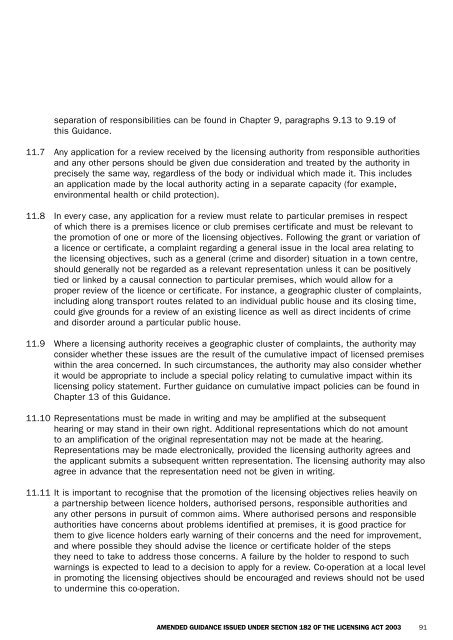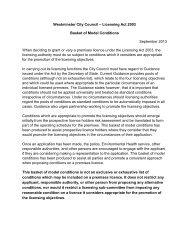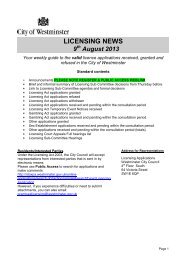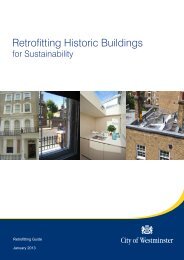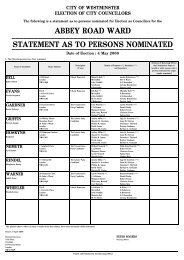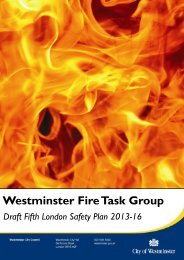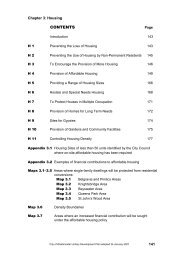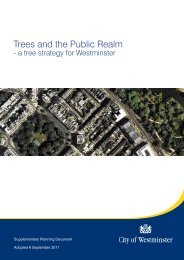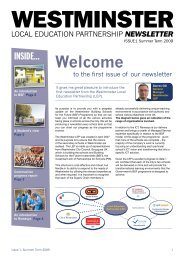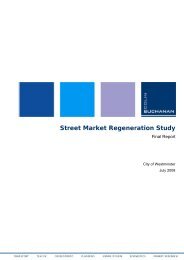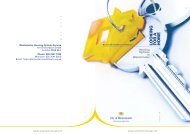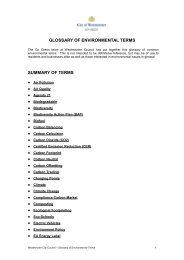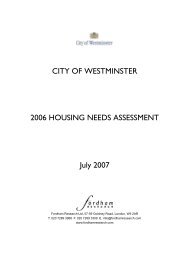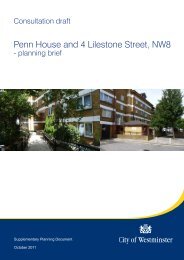Amended guidance issued under section 182 of the Licensing Act ...
Amended guidance issued under section 182 of the Licensing Act ...
Amended guidance issued under section 182 of the Licensing Act ...
Create successful ePaper yourself
Turn your PDF publications into a flip-book with our unique Google optimized e-Paper software.
separation <strong>of</strong> responsibilities can be found in Chapter 9, paragraphs 9.13 to 9.19 <strong>of</strong>this Guidance.11.7 Any application for a review received by <strong>the</strong> licensing authority from responsible authoritiesand any o<strong>the</strong>r persons should be given due consideration and treated by <strong>the</strong> authority inprecisely <strong>the</strong> same way, regardless <strong>of</strong> <strong>the</strong> body or individual which made it. This includesan application made by <strong>the</strong> local authority acting in a separate capacity (for example,environmental health or child protection).11.8 In every case, any application for a review must relate to particular premises in respect<strong>of</strong> which <strong>the</strong>re is a premises licence or club premises certificate and must be relevant to<strong>the</strong> promotion <strong>of</strong> one or more <strong>of</strong> <strong>the</strong> licensing objectives. Following <strong>the</strong> grant or variation <strong>of</strong>a licence or certificate, a complaint regarding a general issue in <strong>the</strong> local area relating to<strong>the</strong> licensing objectives, such as a general (crime and disorder) situation in a town centre,should generally not be regarded as a relevant representation unless it can be positivelytied or linked by a causal connection to particular premises, which would allow for aproper review <strong>of</strong> <strong>the</strong> licence or certificate. For instance, a geographic cluster <strong>of</strong> complaints,including along transport routes related to an individual public house and its closing time,could give grounds for a review <strong>of</strong> an existing licence as well as direct incidents <strong>of</strong> crimeand disorder around a particular public house.11.9 Where a licensing authority receives a geographic cluster <strong>of</strong> complaints, <strong>the</strong> authority mayconsider whe<strong>the</strong>r <strong>the</strong>se issues are <strong>the</strong> result <strong>of</strong> <strong>the</strong> cumulative impact <strong>of</strong> licensed premiseswithin <strong>the</strong> area concerned. In such circumstances, <strong>the</strong> authority may also consider whe<strong>the</strong>rit would be appropriate to include a special policy relating to cumulative impact within itslicensing policy statement. Fur<strong>the</strong>r <strong>guidance</strong> on cumulative impact policies can be found inChapter 13 <strong>of</strong> this Guidance.11.10 Representations must be made in writing and may be amplified at <strong>the</strong> subsequen<strong>the</strong>aring or may stand in <strong>the</strong>ir own right. Additional representations which do not amountto an amplification <strong>of</strong> <strong>the</strong> original representation may not be made at <strong>the</strong> hearing.Representations may be made electronically, provided <strong>the</strong> licensing authority agrees and<strong>the</strong> applicant submits a subsequent written representation. The licensing authority may alsoagree in advance that <strong>the</strong> representation need not be given in writing.11.11 It is important to recognise that <strong>the</strong> promotion <strong>of</strong> <strong>the</strong> licensing objectives relies heavily ona partnership between licence holders, authorised persons, responsible authorities andany o<strong>the</strong>r persons in pursuit <strong>of</strong> common aims. Where authorised persons and responsibleauthorities have concerns about problems identified at premises, it is good practice for<strong>the</strong>m to give licence holders early warning <strong>of</strong> <strong>the</strong>ir concerns and <strong>the</strong> need for improvement,and where possible <strong>the</strong>y should advise <strong>the</strong> licence or certificate holder <strong>of</strong> <strong>the</strong> steps<strong>the</strong>y need to take to address those concerns. A failure by <strong>the</strong> holder to respond to suchwarnings is expected to lead to a decision to apply for a review. Co-operation at a local levelin promoting <strong>the</strong> licensing objectives should be encouraged and reviews should not be usedto <strong>under</strong>mine this co-operation.AMENDED GUIDANCE ISSUED UNDER SECTION <strong>182</strong> OF THE LICENSING ACT 200391


